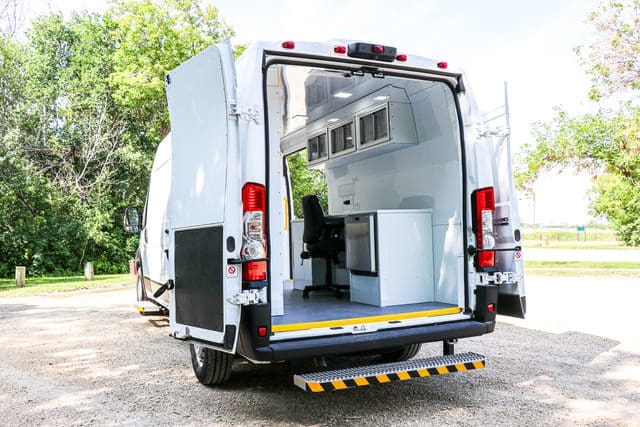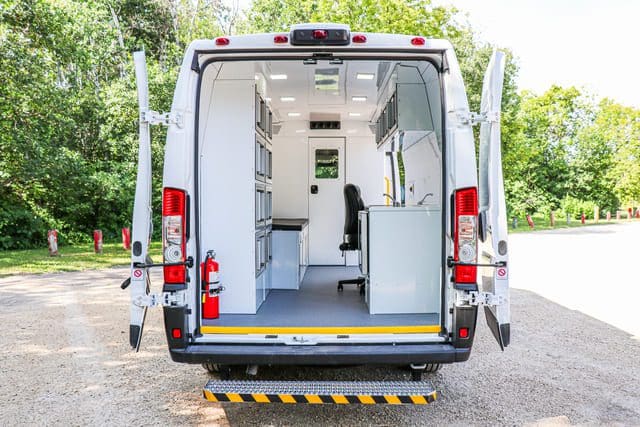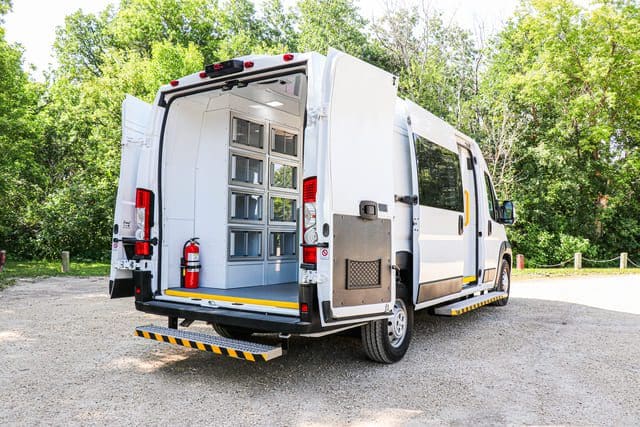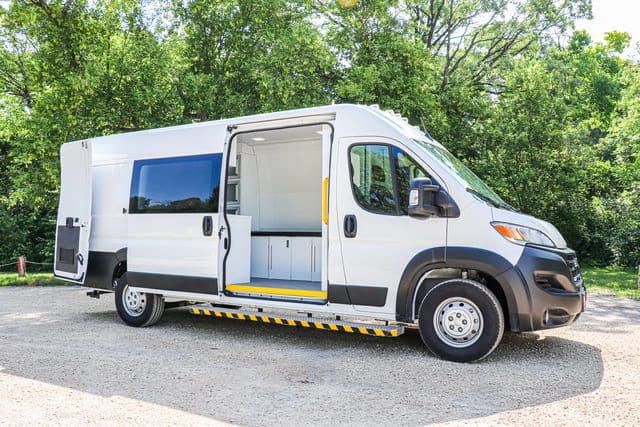When deciding between a mobile medical van lease and buying one outright, it’s important to weigh the potential downsides of making the wrong choice. Buying a mobile medical van outright incurs more upfront costs but has lower costs in the long run. Lease agreements often come with restrictions that hinder the reach of your mobile medical program.
Our team of experts at AVAN Mobility has been manufacturing mobile medical vans for over 10 years. We’ve learned a lot from manufacturing hundreds of mobile medical vehicles in the past decade. With the knowledge we’ve gained in this growing industry, our goal in writing this article is to pass some of it along to you.
In this article, we’re going to take a closer look at the pros and cons of buying and going the mobile medical van lease route. You’ll learn about the reasons why some organizations choose to lease, and the costs involved with purchasing a mobile medical van.
What is a mobile medical van lease?
A mobile medical van lease is like renting a vehicle for a specific period, typically a few years. Instead of owning the van, your organization pays regular monthly payments to use it. These payments cover the van’s use but don’t build ownership equity.
Leasing offers a way to have a mobile medical van without the large upfront cost of buying one. It’s similar to renting a house – you get to use it, but it’s not yours to keep.
Keep in mind that not all mobile medical van manufacturers give the option to lease mobile medical vans to customers.
What are the pros and cons of buying a mobile medical van?
When it comes to acquiring a mobile medical van, organizations have the choice of buying one outright. Let’s look at the advantages and disadvantages of this approach.
Pros
Ownership: When you buy a mobile medical van, you gain full ownership. This means it’s yours to use as long as you need it.
Customization: Owning the van provides the freedom to customize it to meet your specific requirements. You can equip it with the features and equipment that best suit your healthcare services. This includes things like adjustable lights, blood pressure monitors, and medical transport devices.
Long-term use: Once purchased, the mobile medical van serves your organization for an extended period without the need for ongoing monthly payments. This long-term use can be cost-effective in the long run.
Equity building: If you’re financing the van, you make periodic payments, and this builds equity in it. As a result and over time, the van becomes an asset for your organization. This could potentially be valuable for future financial planning or potential resale.
No mileage restrictions: When you own the van, you don’t have to worry about mileage restrictions. You can use it as much as needed without incurring extra charges. This is particularly beneficial for organizations with high mileage requirements. If you’re providing mobile healthcare in rural areas all around the U.S., you don’t want to be restricted to mileage limits.
Resale value: When it’s time to replace the van, you have the option to sell it. This could allow you to recoup some of your initial investment, providing additional funds for a new vehicle or other organizational needs.
Greater control: Ownership gives you greater control over the van’s usage and operations. You can make decisions about its maintenance, scheduling, and appearance without external restrictions posed by lease agreements. This gives you the flexibility to make sure it aligns perfectly with your organization’s goals and standards.
Cons
High upfront cost: One of the main disadvantages of buying is the significant upfront cost. Purchasing a mobile medical van often requires a substantial financial commitment. This can cause some financial strain if you’re working with a limited budget.
Maintenance and repairs: Owning the van means you’re responsible for maintenance and repair expenses. These costs can be unpredictable and potentially burdensome if the van experiences issues. However, with AVAN Mobility, you do get a warranty package for peace of mind.
Depreciation: Over time, the van’s value decreases. While this may not be a significant issue during your ownership, it’s important to consider the potential impact on your organization’s financial health if you plan to sell or replace the van in the future.
What are the pros and cons of a mobile medical van lease?
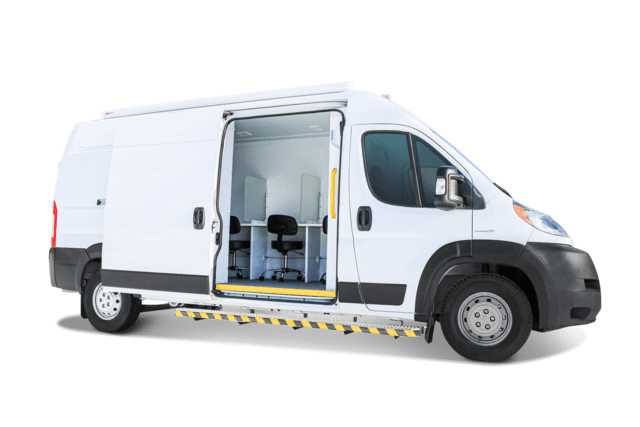
A mobile medical van lease offers certain advantages, but it also comes with its fair share of disadvantages. Let’s examine these aspects:
Pros
Lower upfront cost: Leasing typically involves lower initial payments compared to buying. This can be beneficial for organizations with limited upfront budgets. This allows you to acquire and use the van without a considerable financial burden.
To help lessen the financial burden of purchasing a mobile medical van, take a look at this article for some tips on fundraising for them.
Easy upgrades: Leasing provides flexibility, making it easier to upgrade to newer models or switch to different vehicles as your organization’s needs change. This adaptability can help you stay up-to-date with the latest features and technology.
Predictable expenses: Lease agreements often include maintenance and repair costs, making expenses more predictable. This can help with budgeting and financial planning, as unexpected repair bills are usually the responsibility of the leasing company.
Cons
No ownership: One of the primary downsides of leasing is that you don’t own the van. This means you’re essentially renting it, and you won’t build equity or have an asset to sell in the future.
Higher long-term costs: While the upfront cost is lower, the total cost of a mobile medical van lease over an extended period may be higher compared to buying, making it less cost-effective in the long run.
Mileage restrictions: Lease agreements often come with mileage limits. Exceeding these limits results in extra fees, which can add unexpected expenses to your organization’s budget.
Dependence on lease terms: A mobile medical van lease means adhering to the terms and conditions set by the leasing company, which may limit your flexibility in managing the vehicle according to your organization’s specific requirements.
End-of-lease costs: When the lease ends, you might face additional charges for wear and tear on the van. This means you’d need to return it in near-perfect condition or risk paying fees for any damages.
Making the choice: To buy or lease a mobile medical van
Let’s consider an example of a community healthcare organization called HealthyVille Health Services. They were faced with a choice: Should they buy or lease a mobile medical van from AVAN Mobility to provide essential care in underserved areas?
In the end, HealthyVille decided to purchase the mobile medical van and they’ve been thrilled with their choice. Here’s why:
The van became their trusted partner on the road. They use it to provide uninterrupted medical care without the worries of mileage limits or strict leasing terms. They customized it to perfection, making it a true extension of their services. As years passed, the van became a symbol of their commitment to the community’s health, an asset they were proud to own.
Their decision to buy, though it came with an initial financial commitment, gave them the freedom and sense of ownership that perfectly aligned with their mission. For HealthyVille, it wasn’t just about a vehicle; it was about investing in their community’s well-being.
Where to go next with AVAN Mobility
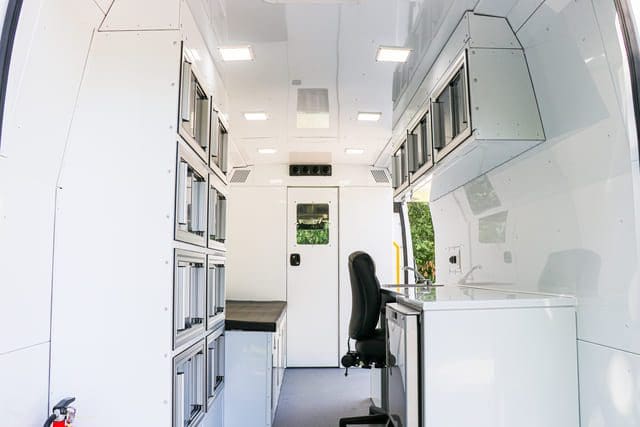
You came to this article looking for more information on buying vs. leasing a mobile medical van.
Now that you know more about the pros and cons of each option, you’re probably wondering what to do next. We suggest you read our article on the cost of a mobile medical van so you’re fully aware of what’s entailed.
You should also take a look at our article on the 4 types of mobile medical vans we offer. Each one is different and caters to organizations offering various types of healthcare services.
If you have any additional questions about mobile medical unit leasing, click the button below to talk to an expert today.
